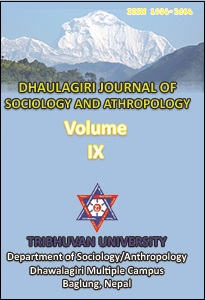Sandhyopaasan:The Hindu Ritual as a Foundation of Vedic Education
DOI:
https://doi.org/10.3126/dsaj.v9i0.14022Keywords:
Sandhyopaasan, ritual, peace of mind, health, Nepali HinduismAbstract
Yoga, meditation and Hasta Mudra Chikitsa (medication through the exercise or gesture of hands) known as spiritual activities in the past have been emerged as bases to maintain one’s health, peace and tranquility. Some people follow yoga, some focus on meditation and others apply “Hasta Chikitsa” or “Mudra”. They are separate traditional exercises. They require to spend 10 to 30 minutes once or twice a day for their optional exercise/s. It is proved that such practice has productive effect in different health treatments. This paper has applied the methods of observation, interview and literature review as qualitative paradigm in exploring their original roots of Vedic Sandhyopaasan. Twice born castes (Brahman, Chhetri and Baishya) of Nepali Hindu society has been found practicing all components of the exercises as a unified ritual of Sandhyopaasan. Upanayan (Bratabandha) ritual teaches Sandhyopaasan procedures for self control and self healing of the performers. Brahman is not eligible as Brahman without doing the ritual daily. However, this study has found that some Dalits have also been practicing Sandhyopaasan daily and feeling relaxed. Findings of this study show that Sandhyopaasan is a compact package of yoga, meditations and Hasta Chikitsa. Students and gurus of Vedas have been regularly following the compact package for inner peace and self control. Root of yoga, meditation and “Mudra” is Sandhyopaasan and this is the base of Hindu education system. The paper analyzes the ritual through Hindu educational perspective.Downloads
Download data is not yet available.
Abstract
3792
PDF
12807
Downloads
Published
2015-12-07
How to Cite
Timilsina, R. R. (2015). Sandhyopaasan:The Hindu Ritual as a Foundation of Vedic Education. Dhaulagiri Journal of Sociology and Anthropology, 9, 53–88. https://doi.org/10.3126/dsaj.v9i0.14022
Issue
Section
Articles




